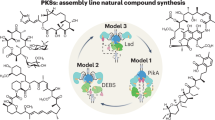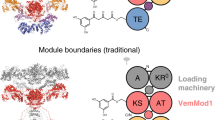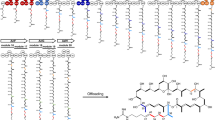Abstract
Type I polyketide synthase (PKS) genes consist of modules ∼3–6 kb long, which encode the structures of 2-carbon units in polyketide products. Alteration or replacement of individual PKS modules can lead to the biosynthesis of 'unnatural' natural products but existing techniques for this are time consuming. Here we describe a generic approach to the design of synthetic PKS genes where facile cassette assembly and interchange of modules and domains are facilitated by a repeated set of flanking restriction sites. To test the feasibility of this approach, we synthesized 14 modules from eight PKS clusters and associated them in 154 bimodular combinations spanning over 1.5-million bp of novel PKS gene sequences. Nearly half the combinations successfully mediated the biosynthesis of a polyketide in Escherichia coli, and all individual modules participated in productive bimodular combinations. This work provides a truly combinatorial approach for the production of polyketides.
This is a preview of subscription content, access via your institution
Access options
Subscribe to this journal
Receive 12 print issues and online access
$209.00 per year
only $17.42 per issue
Buy this article
- Purchase on Springer Link
- Instant access to full article PDF
Prices may be subject to local taxes which are calculated during checkout



Similar content being viewed by others
References
Walsh, C . Antibiotics: Actions, Origins, Resistance (ASM Press, Washington, DC, 2003).
Cortes, J., Haydock, S.F., Roberts, G.A., Bevitt, D.J. & Leadlay, P.F. An unusually large multifunctional polypeptide in the erythromycin-producing polyketide synthase of Saccharopolyspora erythraea. Nature 348, 176–178 (1990).
Reeves, C.D. The enzymology of combinatorial biosynthesis. Crit. Rev. Biotechnol. 23, 95–147 (2003).
Tsuji, S.Y., Cane, D.E. & Khosla, C. Selective protein-protein interactions direct channeling of intermediates between polyketide synthase modules. Biochemistry 40, 2326–2331 (2001).
Gokhale, R.S., Tsuji, S.Y., Cane, D.E. & Khosla, C. Dissecting and exploiting intermodular communication in polyketide synthases. Science 284, 482–485 (1999).
Broadhurst, R.W., Nietlispach, D., Wheatcroft, M.P., Leadlay, P.F. & Weissman, K.J. The structure of docking domains in modular polyketide synthases. Chem. Biol. 10, 723–731 (2003).
Pfeifer, B.A. & Khosla, C. Biosynthesis of polyketides in heterologous hosts. Microbiol. Mol. Biol. Rev. 65, 106–118 (2001).
Kao, C.M., Katz, L. & Khosla, C. Engineered biosynthesis of a complete macrolactone in a heterologous host. Science 265, 509–512 (1994).
McDaniel, R. et al. Multiple genetic modifications of the erythromycin polyketide synthase to produce a library of novel “unnatural” natural products. Proc. Natl. Acad. Sci. USA 96, 1846–1851 (1999).
Kieser, T., Bibb., M.J., Buttner, M.J., Chater, K.F. & Hopwood, D.A. . Practical Streptomyces Genetics (The John Innes Foundation, Norwich, UK, 2000).
Pfeifer, B.A., Admiraal, S.J., Gramajo, H., Cane, D.E. & Khosla, C. Biosynthesis of complex polyketides in a metabolically engineered strain of E. coli. Science 291, 1790–1792 (2001).
Lau, J., Tran, C., Licari, P. & Galazzo, J. Development of a high cell-density fed-batch bioprocess for the heterologous production of 6-deoxyerythronolide B in E. coli. J. Biotechnol. 110, 95–103 (2004).
Kodumal, S.J. et al. Total synthesis of long DNA sequences: synthesis of a contiguous 32-kb polyketide synthase gene cluster. Proc. Natl. Acad. Sci. USA 101, 15573–15578 (2004).
Oliynyk, M., Brown, M.J., Cortes, J., Staunton, J. & Leadlay, P.F. A hybrid modular polyketide synthase obtained by domain swapping. Chem. Biol. 3, 833–839 (1996).
Kao, C.M., Luo, G., Katz, L., Cane, D. & Khosla, C. Manipulation of macrolide ring size by directed mutagenesis of a modular polyketide synthase. J. Am. Chem. Soc. 117, 9105–9109 (1995).
Murli, S., Kennedy, J., Dayem, L.C., Carney, J.R. & Kealey, J.T. Metabolic engineering of E. coli for improved 6-deoxyerythronolide B production. J. Ind. Microbiol. Biotechnol. 30, 500–509 (2003).
Jacobsen, J.R., Cane, D.E. & Khosla, C. Spontaneous priming of a downstream module in 6-deoxyerythronolide B synthase leads to polyketide biosynthesis. Biochemistry 37, 4928–4934 (1998).
Beck, B.J., Aldrich, C.C., Fecik, R.A., Reynolds, K.A. & Sherman, D.H. Iterative chain elongation by a pikromycin monomodular polyketide synthase. J. Am. Chem. Soc. 125, 4682–4683 (2003).
Wilkinson, B. et al. Novel octaketide macrolides related to 6-deoxyerythronolide B provide evidence for iterative operation of the erythromycin polyketide synthase. Chem. Biol. 7, 111–117 (2000).
Moss, S.J., Martin, C.J. & Wilkinson, B. Loss of co-linearity by modular polyketide synthases: a mechanism for the evolution of chemical diversity. Nat. Prod. Rep. 21, 575–593 (2004).
Ranganathan, A. et al. Knowledge-based design of bimodular and trimodular polyketide synthases based on domain and module swaps: a route to simple statin analogues. Chem. Biol. 6, 731–741 (1999).
Wu, N., Cane, D.E. & Khosla, C. Quantitative analysis of the relative contributions of donor acyl carrier proteins, acceptor ketosynthases, and linker regions to intermodular transfer of intermediates in hybrid polyketide synthases. Biochemistry 41, 5056–5066 (2002).
Watanabe, K., Wang, C.C., Boddy, C.N., Cane, D.E. & Khosla, C. Understanding substrate specificity of polyketide synthase modules by generating hybrid multimodular synthases. J. Biol. Chem. 278, 42020–42026 (2003).
McDaniel, R., Kao, C.M., Hwang, J.S. & Khosla, C. Engineered intermodular and intramodular polyketide synthases fusions. Chem. Biol. 4, 667–674 (1997).
Kim, B.S. et al. An unexpected interaction between the modular polyketide synthases, erythromycin DEBS1 and pikromycin PikAIV, leads to efficient triketide lactone synthesis. Biochemistry 41, 10827–10833 (2002).
Ashley, G.W. & Carney, J.R. API-mass spectrometry of polyketides. I. A study on the fragmentation of triketide lactones. J. Antibiot. (Tokyo) 57, 224–234 (2004).
Beck, B.J., Aldrich, C.C., Fecik, R.A., Reynolds, K.A. & Sherman, D.H. Substrate recognition and channeling of monomodules from the pikromycin polyketide synthase. J. Am. Chem. Soc. 125, 12551–12557 (2003).
Chuck, J. et al. Molecular recognition of diketide substrates by a beta-ketoacyl-acyl carrier protein synthase domain within a bimodular polyketide synthase. Chem. Biol. 4, 757–766 (1997).
Hinterding, K., Singhanat, S. & Oberer, L. Stereoselective synthesis of polyketide fragments using a novel intramolecular Claisen-like condensation/reduction sequence. Tetrahedr. Lett. 42, 8463–8465 (2001).
Wu, N., Tsuji, S.Y., Cane, D.E. & Khosla, C. Assessing the balance between protein-protein interactions and enzyme-substrate interactions in the channeling of intermediates between polyketide synthase modules. J. Am. Chem. Soc. 122, 6465–6474 (2001).
Acknowledgements
We thank Jim Kealey, Sumati Murli and Jonathan Kennedy for providing strains, vectors and procedures for polyketide production in E. coli and Gary Ashley and Leonard Katz for the critical review of the manuscript. This work was supported in part by National Institute of Standards and Technology Advanced Program Grant 70NANB2H3014.
Author information
Authors and Affiliations
Corresponding author
Ethics declarations
Competing interests
The authors declare no competing financial interests.
Supplementary information
Supplementary Fig. 1
Product ion scan of unlabeled (a) and 13C labeled (b) TKLs. (PDF 25 kb)
Supplementary Table 1
Sources of 140 modules analyzed. (PDF 24 kb)
Supplementary Table 2
Restriction sites introduced in PKS building blocks. (PDF 18 kb)
Supplementary Table 3
Substrate specificities of PKS modules used in this study. (PDF 24 kb)
Supplementary Table 4
Expression plasmids used in the bimodular tests. (PDF 47 kb)
Supplementary Table 5
Characterization of triketide lactones obtained in this study by mass spectrometry. (PDF 22 kb)
Rights and permissions
About this article
Cite this article
Menzella, H., Reid, R., Carney, J. et al. Combinatorial polyketide biosynthesis by de novo design and rearrangement of modular polyketide synthase genes. Nat Biotechnol 23, 1171–1176 (2005). https://doi.org/10.1038/nbt1128
Received:
Accepted:
Published:
Issue Date:
DOI: https://doi.org/10.1038/nbt1128
This article is cited by
-
Enzymology of assembly line synthesis by modular polyketide synthases
Nature Chemical Biology (2023)
-
Engineering the stambomycin modular polyketide synthase yields 37-membered mini-stambomycins
Nature Communications (2022)
-
Engineering of PKS Megaenzymes—A Promising Way to Biosynthesize High-Value Active Molecules
Topics in Catalysis (2022)
-
Engineering the acyltransferase domain of epothilone polyketide synthase to alter the substrate specificity
Microbial Cell Factories (2021)
-
Application of CRISPR/Cas System in the Metabolic Engineering of Small Molecules
Molecular Biotechnology (2021)



